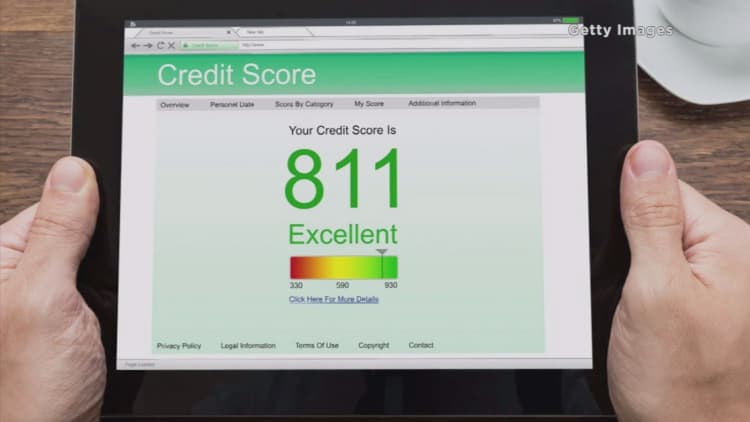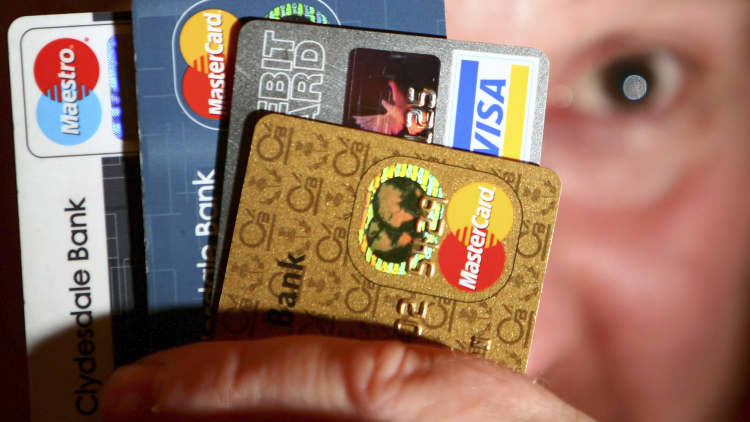
Think you know your credit score? Think again.
The number you see — whether you paid for your score or not — is probably not what a lender gets.
The Consumer Financial Protection Bureau announced an enforcement action Tuesday against credit bureaus Equifax and TransUnion, and their subsidiaries. The CFPB said the companies deceived consumers about the value of the scores sold.
"In their advertising, TransUnion and Equifax falsely represented that the credit scores they marketed and provided to consumers were the same scores lenders typically use to make credit decisions," according to the announcement. "In fact, the scores sold by TransUnion and Equifax were not typically used by lenders to make those decisions."
As part of the action, the companies will pay more than $17.6 million in restitution to customers, and another $5.5 million in penalties to the CFPB. The bureaus must also "clearly inform consumers about the nature of the scores they are selling," according to the release from the CFPB.
Officials at Equifax did not respond to requests for comment. In an emailed statement, a spokesman for TransUnion said the company believes its marketing has been clear, but is committed to improving its customer experience.

Experts say the CFPB action highlights something consumers may not understand about credit scores: There's no one magic three-digit number that lenders use to assess borrowers' creditworthiness and set rates.
The scores you'll see can vary widely from source to source — and are likely to be altogether different than the number the lender pulls when you submit your application for a mortgage or credit card, said credit expert Gerri Detweiler, author of "Finance Your Own Business." (On a given day, Detweiler's score has varied by more than 40 points across sources, she said.)
Some of the reasons your score varies:
• Score type. "There are dozens of credit risk scores commercially available and in use today," said credit expert John Ulzheimer, who has worked with Fico, Equifax and Credit.com. Most lenders use one under the Fico or VantageScore brands, he said. Each score model gives different weight to factors like how much of your available credit you're using and your payment history.
• Customization. Even under those widely used models, lenders often use proprietary formulas based on criteria that are of interest to them, said Ruth Susswein, deputy director of national priorities for advocate Consumer Action. Your score might be specific to one lender and even a particular product — say, car loans versus credit cards.
• Credit-scoring company. Your score is based on data pulled from your credit report at one of the three major firms. Information on those reports can vary from company to company, especially if there's an error.
• Score version. Scoring models are updated periodically, but your lender may not be using the latest version. Mortgage lenders in particular tend to use older models, Detweiler said.
• Timing. "What the credit bureaus and folks like Fico will tell you is that this is not a stationary thing," Susswein said. Your score can change daily as that information on your report changes — for example, you apply for a car loan or the scoring company gets its monthly sweep of info on your current credit card balances.

Variation doesn't mean you shouldn't pay attention to your score(s), however. There are plenty of free ways to take a look, including third-party sites and as a perk from your credit-card issuer.
"Every credit score that's being given away or sold to consumers has value," Ulzheimer said. "They are all directionally accurate, meaning if you have a poor credit report you're going to have a poor credit score regardless of the score brand. And, if you have great credit reports you're going to have great credit scores regardless of the score brand."
The key takeaway is the information provided with your score indicating why the number is what it is, Susswein said. That tells you what actions you might take to improve your creditworthiness.


